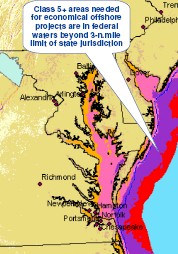I stumbled across this story while researching my lead column for this week’s Rebellion. It was so cool and so under-reported that I just had to write about it. Virginia’s greatest natural energy endowment is not the coal seams of southwest Virginia but the windy expanse of the continental shelf. The potential for generating electricity through windpower is orders of magnitude greater off the coast than it is inland. And unlike Virginia’s coal reserves, which are rapidly depleting, wind is renewable.
According to computer models created by Virginia Tech engineers, the Mid-Atlantic coastline between Virginia and Delaware is the most ideally suited location on the East Coast to place windfarms. A plot the size of Virginia Beach, encompassing about three percent of Virginia’s continental shelf, could hold enough wind-powered turbines to supply 20 percent of the state’s current power needs. Unlike the controversial wind farm proposed off the coast of Cape Code, Virginia’s windmills would stand 10 or more miles from the shore, making them nearly invisible to frolickers on the beach.
Outside of hydroelectric, which has few viable sites left to exploit, wind power is the most economically competitive with fossil fuels of all the renewable fuels. Wind power is not pie in the sky. Offshore development of wind farms is already taking place in Europe. We don’t have to invent anything. All we have to do is learn from the Europeans.
Wind power could represent a two-fer for Virginia. Not only is wind a non-polluting source of energy, it could form the basis of a major new industry. Who would be better equipped to fabricate the massive wind turbines, which are the size of Boeing 747s, and then install them in 50 feet of water than the steel-benders in the Norfolk/Newport News ship-building/repair sector? If Virginia gets the jump on neighboring states, Hampton Roads could become the center of a vibrant new industry.
Here’s the story:
Wind Shear
Virginia is an energy-rich state, and the mother lode sits off the coast. Electric power generated by off-shore wind turbines could slice our dependence on polluting fossil fuels within a decade or two.
Update: Virginia wind-power enthusiasts should check out Virginia Wind, a website dedicated to wind power in Virginia.


Leave a Reply
You must be logged in to post a comment.